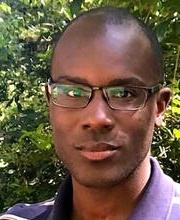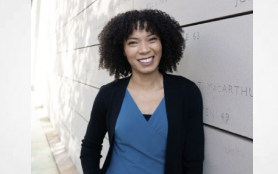
Joining the UC Berkeley Law faculty is a homecoming for Alina Ball and Jason Ferguson, the school’s latest hires.
Ball, an East Bay native, will lead the Social Enterprise Clinic in the growing Clinical Program. Ferguson, who earned his Ph.D. in sociology from UC Berkeley, will teach and advise students in the law school’s Jurisprudence and Social Policy Program(opens in a new tab) (JSP) starting this fall.
Both are thrilled to be back.
“This is an opportunity to build on the work that I’ve been doing over the last decade,” says Ball, who ran a similar clinic at UC Law San Francisco. “Now, I can really take that to a deeper level by being at a law school that not only financially supports the clinic work but also provides opportunity for collaboration across the university.”
Ferguson says the JSP, “one of the most unique Ph.D.-granting programs in the country,” drew him to the job.
“When I was a Ph.D. student, I was fortunate enough to learn about this extraordinary interdisciplinary program in law and society housed inside the law school,” says Ferguson, who spent four years at UCLA and is at the Harvard Society of Fellows this academic year.
“Both JSP and the affiliated Center for the Study of Law and Society(opens in a new tab) were major resources for me and played an important role in my turn toward the critical study of law in context and law in action,” he adds. “I look forward to taking advantage of the multidisciplinary environment and the fruitful intellectual exchanges with colleagues across the law school.”
UC Berkeley Law Dean Erwin Chemerinsky says he’s delighted by the arrival of Ball and Ferguson.
“Alina is a very experienced and nationally renowned clinical professor who will strengthen our Clinical Program by creating an economic development clinic focused on helping small businesses,” he says. “Jason strengthens our Jurisprudence and Social Policy Program with his research and teaching on race, sexuality, and the law. Both are terrific hires and I very much look forward to being their colleague.”
Experience and expertise
Ball’s career as a clinical professor grew out of her passion for two distinct areas: transactional law and racial justice. She went to UCLA Law knowing she wanted to do transactional work in economically marginalized communities.
“Lawyers have been doing this type of work for a really long time, but there weren’t ready made pathways to how to do this — there wasn’t a how-to guide of how to be a transactional social justice lawyer,” she says.
Ball worked at Morrison & Foerster in San Francisco and Washington, D.C., focusing on representing private and public companies in debt, equity, and M&A transactions. She then got a teaching fellowship at Georgetown Law, where she also earned an LL.M.
“I realized this is the sweet spot of the technical skills that I wanted to use and the ability to work within the communities where I’m most inspired,” Ball says. “My two guiding principles have always been a desire to use the technical skills that allow me to do creative problem solving within communities that I deeply care about and authenticity — really making sure that I’m able to live my values in the work that I’m doing.”
Students in the Social Enterprise Clinic will work as outside counsel for local businesses with a social or environmental mission, assisting with corporate governance, regulatory compliance, formation issues, and contract drafting.

Ferguson, whose research mines the intersection of the sociology of law, neo-institutional theory, political sociology, and global and transnational studies, will teach a JSP seminar on law and the geopolitics of sexuality and an undergraduate Legal Studies course, Sexuality and Social Theory, this fall. He joins a strong lineup of sociologists on the law school faculty, and uses statistical, archival, interviewing, and ethnographic methods to analyze a range of social phenomena, including the structure and evolution of laws regulating sexuality.
He also champions less conventional, relational statistical methods such as Multiple Correspondence Analysis, the method of choice of the late renowned sociologist Pierre Bourdieu.
JSP and the broader institution is an ideal place to further his research, Ferguson says.
“In my scholarship and teaching, I seek to marry sustained engagement with social theory and methodologically rigorous empirical research,” he says. “I’m positive this exciting intellectual environment will open up new vistas for my scholarship and bring my work to new audiences.”
Professor Dylan C. Penningroth, associate dean for the JSP and Legal Studies(opens in a new tab) programs, says Ferguson is an excellent addition.
“Jason Ferguson’s research focuses on how laws regulating sexuality — especially same-sex relations — constitute symbolic boundaries of ethnoracial and ethnonational belonging,” Penningroth says. “He brings tremendous opportunities for conversation and collaboration across JSP and the law school, from mentoring a broad range of doctoral students conducting research on race, law, and sexuality, including research in international and comparative contexts, to courses on law and classical social theory, to helping JSP and Legal Studies build its race and law curriculum.”
Ever-expanding horizons
The Social Enterprise Clinic is one of three new clinics on the horizon, including the first Family Defense Clinic on the West Coast, and Clinical Program Director Laura Riley says Ball is a terrific addition.
“We are thrilled that Alina Ball is joining the Clinical Program to found and lead the Social Enterprise Clinic,” she says. “The clinic’s focus on racial and economic justice and commitment to providing legal representation to social enterprises will benefit both communities and students interested in thinking critically about the relationships among law, business, and racial equity.”
Ball says she’s excited to be part of the process of continuing to enhance the program.
“Berkeley is consistently listed as one of the strongest clinical programs in the country, and it was exciting to me both that the leadership of the law school was investing in it and thinking strategically about how to grow the program and stay cutting edge,” she says.
An additional draw, Ball says, is the wide range of faculty doing work in areas that converge with her interests, including the law school’s growing consumer law group.
“Berkeley has a demonstrated commitment to hiring cutting-edge voices, including scholars of color and scholars who center economic justice, and that was exciting to me,” Ball says. “I look forward to being part of this rich intellectual community.”




